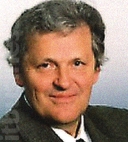Miklós Boda
He began his professional career at the Semiconductor Research Institute (HAFO) in Stockholm in 1971. From 1978 he worked as an LSI expert at DATASAAB. From 1980 he was head of the VLSI design and testing department at Philips, and then held various research and development (R&D) management positions. From 1990 he worked as head of Advanced Technology Research and Network Research at ELLEMTEL Telecommunication System Laboratories (Ericsson and TELIA) and Ericsson Research until 2004.
From 1990 to 1992 he was a member of the board of directors of the MULTI-G program in Stockholm. From 1992 to 1998 he was the coordinator of the national program called Swedish ATM Platform and the chairman of the Ericsson Concern Committee for Artificial Neural Networks and Artificial Intelligence.
In 1992, he established the HSN (High Speed Network) laboratory at the Budapest University of Technology (BME). This innovative collaboration, focusing on the properties of communication networks, in itself attracted the recognition of experts around the world, but the fact that Ericsson employed a large number of doctoral students as researchers in such a way that their research results turned into a marketable product in record time was unique in the industry.
From 1996 to 2004, he held the position of Director of the R&D unit of Ericsson Hungary Kft., then Deputy CEO; in 1996, he was the founder of Ericsson Traffiklab, and in 1998, of Ericsson R&D.
He has participated in the work of the Board of Directors and Senate of several universities (North Carolina State University, Columbia New York, BME, ELTE, Veszprém University). He is a member of the Hungarian Academy of Engineering (MMA), founding president of the Swedish Neuronet Society, and secretary general of the European Alliance for Innovation. He was a member of the board of directors of the world's largest particle physics laboratory, CERN; and was chairman of the Hungarian CERN Committee.
From 2004 to 2006, he held the position of President of the National Research and Technology Office (NKTH) with the rank of State Secretary. He was a strategic advisor to the rector at BME, ELTE and Károly Róbert College.
In January 2008, at ministerial level, José Manuel Barroso and Jan Figel appointed him as a member of the 4-member European Institute of Innovation & Technology (EIT) Governing Board Identification Committee, and he then actively participates in the work of EIT Digital Budapest as a strategic advisor.
His awards: Széchenyi Prize (1999); Neumann Prize (NJSZT, 2002); Tódor Kármán Prize (Minister of Education, 2002); László Kozma Memorial Medal (BME, 2010).
Created: 2018.12.22. 09:51
Last modified: 2025.04.13. 18:28

